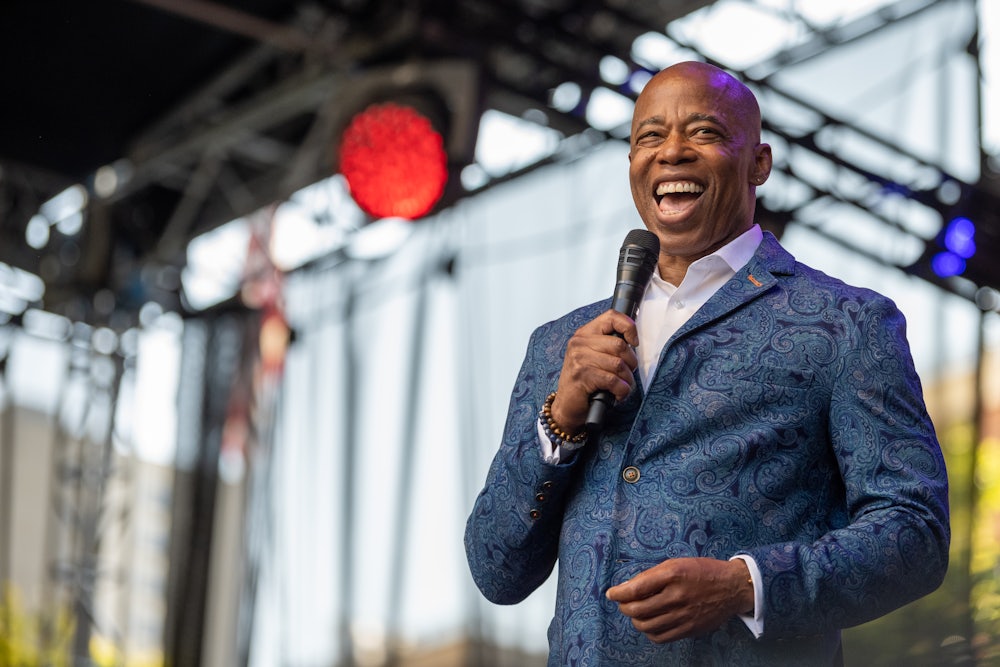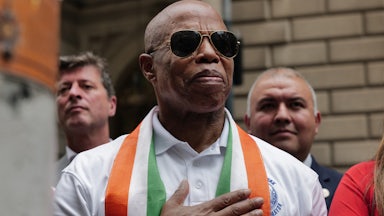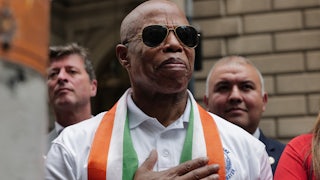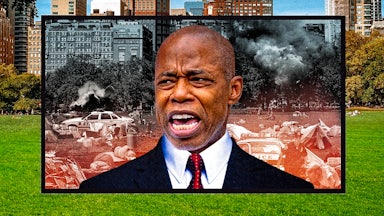In his short time as the mayor of New York City, Eric Adams has built a reputation for playing a starring role in some of the most cartoonish moments that New Yorkers have lived through in recent years. But earlier this month, Adams’s seriocomic reign sunk to a new and outlandish low when federal agents raided the home of his lead fundraiser—suddenly linking Adams to a bizarre Turkish foreign lobbying and illicit donation scheme.
The details that have emerged so far remain murky, but the little we know already paints a damning picture. According to The New York Times, a search warrant pertinent to the case centered on “whether the mayor’s campaign kicked back benefits” to “Turkish officials,” as well as to a Brooklyn-based construction company with Turkish connections. CNN further reported that investigators are searching for evidence that foreign nationals “may have ‘bundled’ donations” to the mayor’s campaign—with others acting as “straw contributors” to obscure the foreign sources of the funds.
At first blush, the scheme borders on the ridiculous; as mayor, Adams is hardly a prominent figure in American foreign policy and would not be the most logical official for foreign financiers or regimes like Turkey to target. But on Sunday, we got confirmation of what these donors may have gotten for their alleged payments. As The New York Times reported, Adams “pressed city officials” to fast-track the opening of a high-rise for the Turkish Consulate General, despite concerns about safety issues. Adams’s “unusual intervention” allowed Turkish autocrat Recep Erdoğan to preside over the opening of what is “reportedly Turkey’s most expensive mission”—a building that, as Erdoğan claimed, reflects Turkey’s “increased power.”
Foreign dictatorships are always expanding and refining the broad range of ways in which they target, manipulate, and sway American policymakers, and this scheme seems to have placed Adams at the center of some of these innovations. As Turkish officials were undoubtedly aware, Adams—who has not been formally accused of any crimes and who claimed he constantly told staff to “follow the law”—was a clear mark, as he’d never evinced any concerns about accepting foreign funds previously. In 2021, the New York Daily News reported that Adams had “accepted thousands of dollars in travel and other perks” from some of the world’s most kleptocratic regimes, including China and Azerbaijan. Turkey, likewise, bankrolled Adams’s travel, paying thousands of dollars more for Adams’s multiple trips to the country since 2015. Adams defended his regime-sponsored visits as “totally appropriate,” claiming he was focused on trying to “further relations” between New York City and other nations.
On its face, there’s nothing nominally wrong with Adams’s decision to accept these funds, nor is there any allegation that he personally hid any information about the funding. But he also didn’t appear ever to question why it was that such autocratic regimes might want to sponsor his trips abroad—or might want to help finance his election efforts. Indeed, even as his political star has continued to rise, there’s no record of Adams ever criticizing any of the governments that have enabled his various gallivants around the world or any of the regimes that have fêted him during his globe-trotting sprees.
During and after his travels, Adams didn’t utter discouraging words about his hosts. For example, he’s kept mum on such matters as China’s sprawling concentration camp system and Azerbaijan’s descent into outright dictatorship. Instead, the mayor has happily stumped for his hosts; at one point, he even announced that he would move to Azerbaijan after his retirement from government.
But it’s Turkey that appears to have a special relationship with Hizzoner. It’s unclear how many times Adams has visited the country while in public office. (Nor does the mayor even appear aware; as he said last month, “I’m probably the only mayor in the history of this city that has not only visited Turkey once, but I think I’m on my sixth or seventh visit to Turkey.”)
It’s nevertheless clear that Adams has found willing Turkish benefactors wherever he looked—and that the mayor was only too willing to help his hosts. From Turkish flag-raising in New York (a “first for any New York City mayor,” New York wrote) to praising Turkey’s handling of the Syrian refugee crisis, Adams has been one of the most outspoken pro-Turkish political voices in recent years, at any level of American politics. He said in 2017 that he wanted to buy a home in Istanbul itself. And last week, The City reported that Adams further received funds from leaders of a foundation directly overseen by the family of Erdoğan himself.
Targeting Adams also makes far more sense if we look at the Turkish angle itself. The mayor is hardly the lone public official Turkish officials have reportedly targeted in the United States—nor is he even the most high-profile. Mike Flynn, Donald Trump’s former national security adviser, pleaded guilty to secretly working at the behest of Turkey, a topic for which former Trump lawyer Rudy Giuliani was likewise investigated (though never charged). Indeed, the Trump years were, as Courthouse News wrote in 2019, “boom times for Turkey’s lobbyists.” And if the recent search warrant against Adams is anything to go by, those boom times have persisted long since Trump left office.
But the newest Adams scandal also presents a new frontier for both Turkish lobbying efforts and foreign lobbying efforts more broadly. It wasn’t just that Turkish hosts glad-handed Adams, or that he happily spun Turkey to new audiences in return. The search warrant’s claims of potential foreign donations injected into Adams’s election campaign would represent a new tool in Ankara’s foreign lobbying tool kit—and, potentially, a far worse precedent for the rest of us.
To be sure, Turkish donations to Adams wouldn’t be the first such foreign financing scandal in recent American history; former Trump foreign policy adviser George Nader was jailed for secretly routing funds from the UAE’s dictatorship into the 2016 presidential election. (Foreign funding of American campaigns is illegal, whether at federal or local levels.)
But Adams’s reported receipt of Turkish campaign funds, hidden behind a range of cutouts, indicates that foreign regimes are no longer interested just in federal elections—they now have their eyes on local, municipal elections as well. Put another way: The Adams allegations are just one scandal in the annals of a mayor who often paints himself into some ridiculous corners, but they also may well be the canary in the coal mine for how foreign regimes will target American politicians moving forward. And given how difficult it is to monitor and enforce campaign financing in the first place, why wouldn’t more regimes be following the model that Turkey is alleged to have set in this instance?
In short, it’s too early to tell whether or not Adams is the exception, or the new rule. But there’s at least one bit of good news buried in the revelations. Despite setbacks elsewhere—including failed prosecutions of a number of pro-Trump figures, working at the behest of foreign regimes—the search warrant indicates that prosecutors are at least still willing to target these kinds of networks. Toss in the fact that the search warrant came shortly after new indictments against Senator Bob Menendez for similar foreign lobbying crimes, and U.S. officials are showing new signs of life when it comes to cracking down on these kinds of foreign financial links.
Whether it’ll be enough to topple Adams, or even Menendez, remains to be seen. But if Adams ends up in further legal trouble, he may be glad he purchased that home in Istanbul—just not for the reasons he expected.










